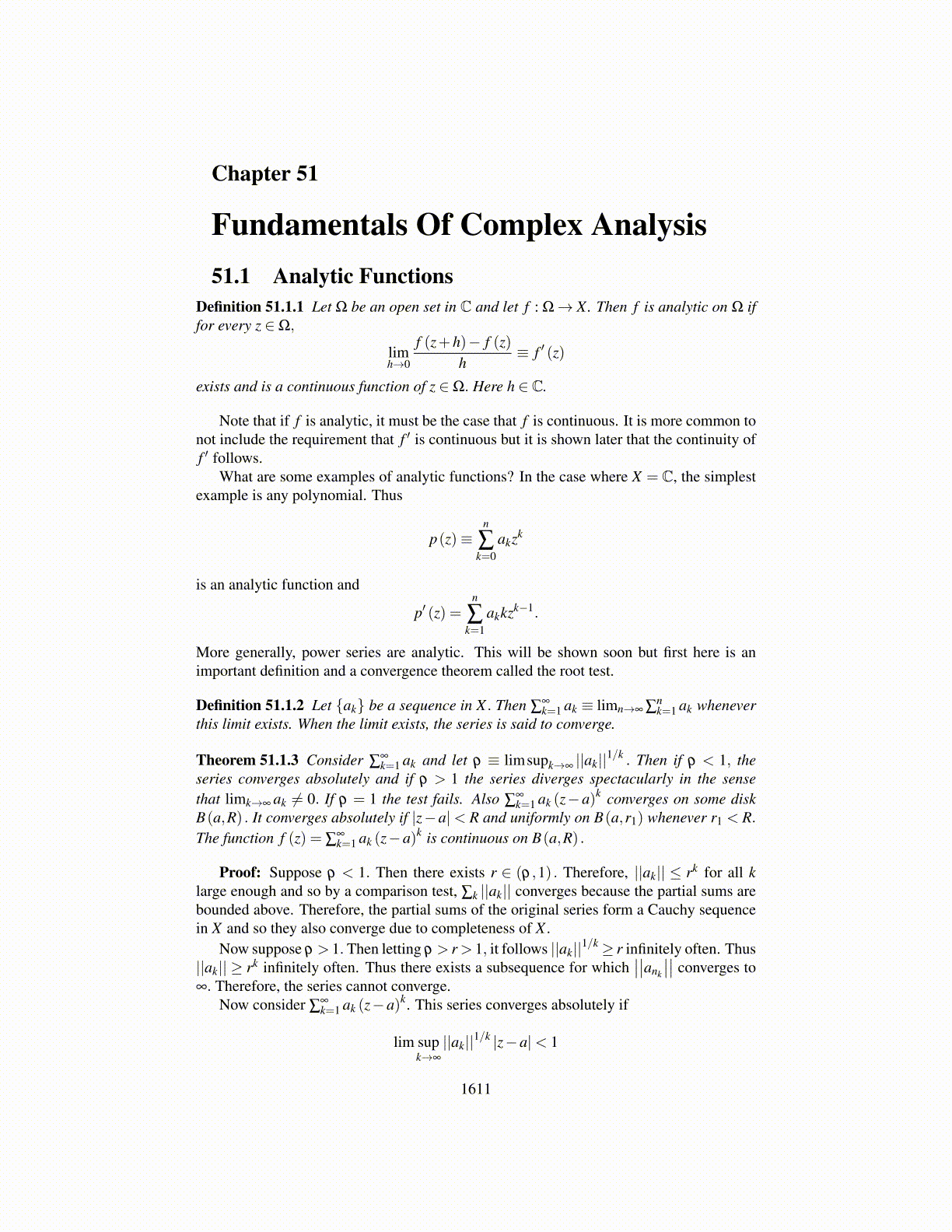
50.1. EXERCISES 1611
Now approximating with sums and using the definition,∫
γ1idz = γ1 (t j)− γ1
(t j−1
)and so
∫γ2 j
∫γ1i
f (γ1 (ti) ,γ2 (s j))dzdw = f (γ1 (ti) ,γ2 (s j))∫
γ2 j
∫γ1i
dzdw
= f (γ1 (ti) ,γ2 (s j))∫
γ1i
∫γ2 j
dwdz =∫
γ1i
∫γ2 j
f (γ1 (ti) ,γ2 (s j))dwdz(50.0.17)
Therefore, ∥∥∥∥∫γ1
∫γ2
f (z,w)dwdz−∫
γ2
∫γ1
f (z,w)dzdw∥∥∥∥≤
∥∥∥∥∥ ∑ni=1 ∑
mj=1∫
γ1i
∫γ2 j
f (z,w)dwdz−∑
ni=1 ∑
mj=1∫
γ1i
∫γ2 j
f (γ1 (ti) ,γ2 (s j))dwdz
∥∥∥∥∥+
∥∥∥∥∥ ∑ni=1 ∑
mj=1∫
γ1i
∫γ2 j
f (γ1 (ti) ,γ2 (s j))dwdz−∑
ni=1 ∑
mj=1∫
γ2 j
∫γ1i
f (γ1 (ti) ,γ2 (s j))dzdw
∥∥∥∥∥+
∥∥∥∥∥ ∑ni=1 ∑
mj=1∫
γ2 j
∫γ1i
f (γ1 (ti) ,γ2 (s j))dzdw−∑
ni=1 ∑
mj=1∫
γ2 j
∫γ1i
f (z,w)dzdw
∥∥∥∥∥From 50.0.17 the middle term is 0. Thus, from the estimates 50.0.16 and 50.0.15,∥∥∥∥∫
γ1
∫γ2
f (z,w)dwdz−∫
γ2
∫γ1
f (z,w)dzdw∥∥∥∥
≤ 2εV (γ2, [a2,b2])V (γ1, [a1,b1])
Since ε is arbitrary, the two integrals are equal.
50.1 Exercises1. Let γ : [a,b]→ R be increasing. Show V (γ, [a,b]) = γ (b)− γ (a) .
2. Suppose γ : [a,b]→C satisfies a Lipschitz condition, |γ (t)− γ (s)| ≤K |s− t| . Showγ is of bounded variation and that V (γ, [a,b])≤ K |b−a| .
3. γ : [c0,cm]→ C is piecewise smooth if there exist numbers, ck,k = 1, · · · ,m suchthat c0 < c1 < · · · < cm−1 < cm such that γ is continuous and γ : [ck,ck+1]→ C isC1. Show that such piecewise smooth functions are of bounded variation and give anestimate for V (γ, [c0,cm]) .
4. Let γ : [0,2π]→ C be given by γ (t) = r (cosmt + isinmt) for m an integer. Find∫γ
dzz .
5. Show that if γ : [a,b]→ C then there exists an increasing function h : [0,1]→ [a,b]such that γ ◦h([0,1]) = γ∗.